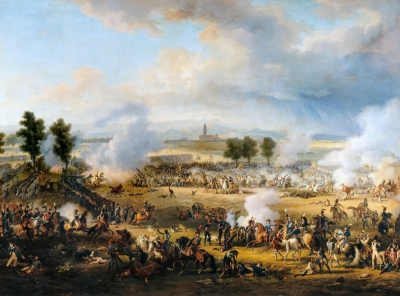The Battle of Winterthur (27 May 1799) was an important action between elements of the Army of the Danube and elements of the Habsburg army, commanded by Friedrich Freiherr von Hotze, during the War of the Second Coalition, part of the French Revolutionary Wars. The small town of Winterthur lies 18 kilometers (11 mi) northeast of Zrich, in Switzerland. Because of its position at the junction of seven roads, the army that held the town controlled access to most of Switzerland and points crossing the Rhine into southern Germany. Although the forces involved were small, the ability of the Austrians to sustain their 11-hour assault on the French line resulted in the consolidation of three Austrian forces on the plateau north of Zrich, leading to the French defeat a few days later.
By mid-May 1799, the Austrians had wrested control of parts of Switzerland from the French as forces under the command of Hotze and Count Heinrich von Bellegarde pushed them out of the Grisons. After defeating Jean-Baptiste Jourdan's 25,000-man Army of the Danube at the battles of Ostrach and Stockach, the main Austrian army, under command of Archduke Charles, crossed the Rhine at the Swiss town of Schaffhausen and prepared to unite with the armies of Hotze and Friedrich Joseph, Count of Nauendorf, on the plains surrounding Zrich.
The French Army of Helvetia and the Army of the Danube, now both under the command of Andr Massna, sought to prevent this merger. Massna sent Michel Ney and a small mixed cavalry and infantry force from Zrich to stop Hotze's force at Winterthur. Despite a sharp contest, the Austrians succeeded in pushing the French out of the Winterthur highlands, although both sides took high casualties. Once the union of the Habsburg armies took place in early June, Archduke Charles attacked French positions at Zrich and forced the French to withdraw beyond the Limmat.
The War of the Second Coalition (1798/9 – 1801/2, depending on periodisation) was the second war on revolutionary France by most of the European monarchies, led by Britain, Austria and Russia, and including the Ottoman Empire, Portugal, Naples and various German monarchies, though Prussia did not join this coalition, and Spain supported France.
The overall goal of Britain and Russia was to contain the expansion of the French Republic and to restore the monarchy in France, whereas Austria, which was still weakened and in deep financial debt from the War of the First Coalition, primarily sought to recover its position and come out of the war stronger than it entered. Due in important part to this difference in strategy amongst the three major allied powers, the Second Coalition failed to overthrow the revolutionary regime, and French territorial gains since 1793 were confirmed. In the Franco–Austrian Treaty of Lunéville in February 1801, France held all of its previous gains and obtained new lands in Tuscany, Italy, while Austria was granted Venetia and the Dalmatian coast. Most other allies would also sign separate peace treaties with the French Republic in 1801. Britain and France signed the Treaty of Amiens in March 1802, followed by the Ottomans in June 1802, bringing an interval of peace in Europe that lasted several months until Britain declared war on France again in May 1803. The renewed hostilities would culminate in the War of the Third Coalition.

1799May, 27
War of the Second Coalition: Austrian forces defeat the French at Winterthur, Switzerland.
Choose Another Date
Events on 1799
- 9Jan
William Pitt the Younger
British Prime Minister William Pitt the Younger introduces an income tax of two shillings to the pound to raise funds for Great Britain's war effort in the Napoleonic Wars. - 4May
Battle of Seringapatam
Fourth Anglo-Mysore War: The Battle of Seringapatam: The siege of Seringapatam ends when the city is invaded and Tipu Sultan killed by the besieging British army, under the command of General George Harris. - 27May
Battle of Winterthur (1799)
War of the Second Coalition: Austrian forces defeat the French at Winterthur, Switzerland. - 25Jul
Battle of Abukir (1799)
At Abu Qir in Egypt, Napoleon I of France defeats 10,000 Ottomans under Mustafa Pasha. - 19Sep
Battle of Bergen (1799)
French Revolutionary Wars: French-Dutch victory against the Russians and British in the Battle of Bergen.

 English
English  español
español  français
français  português
português  русский
русский  العربية
العربية  简体中文
简体中文 